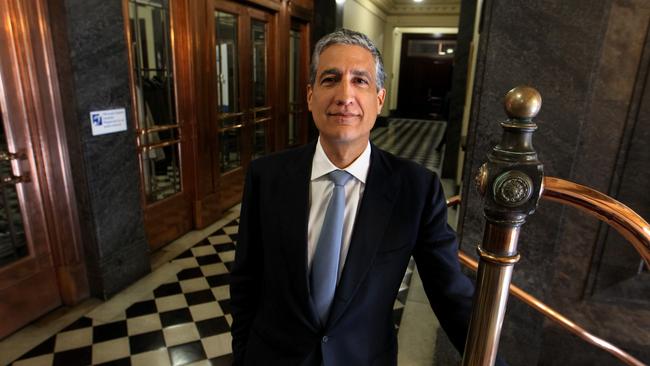Resources market may be stabilising, says Orica CEO
Orica chief Alberto Calderon won’t call the bottom of the resources market downturn, but hesays it’s stabilising.

Explosives group Orica is not yet prepared to call the bottom of the resources market downturn.
But, armed with feedback from an unrivalled presence at 450 mines across the world, its chief executive Alberto Calderon is prepared to say things are stabilising.
Speaking after an address to the American Chamber of Commerce at Melbourne’s Crown yesterday, the former senior BHP Billiton executive said he was very wary of making forecasts.
“But what I see from our customers is that they are just getting on with it,’’ Mr Calderon said.
He said that deflation in costs had occurred, which meant the cost base of the miners was now more competitive, with the prospect of additional revenue-boosting weakness in the dollar as the US sets about increasing interest rates.
“So I don’t see things getting sustainably worse from here. That is a way of saying things are stabilising,’’ Mr Calderon said.
Since his arrival at Orica in May 2015 after losing out to Andrew Mackenzie as the replacement chief executive to Marius Kloppers at BHP Billiton, Mr Calderon’s response to the tough market conditions has been to take “decisive action to control those elements we can’’.
In May the company reported it was more than half way towards its target of securing sustainable cost savings of $70-80 million by the end of this financial year.
It has also locked in contract volumes for greater certainty, rationalised the eastern states ammonium nitrate market, and reinvigorated its Minova ground support business in the US with a view to taking it into new markets.
Mr Calderon said there were lessons to be had for others from an earlier decision to cut costs by closing Minova’s specialised sales division.
“This significantly affected our ability to compete in the profitable ‘non-mining’ natural market for Minova, and while we benefited from the cost reduction in the short-term, it actually destroyed value. And trust me, rebuilding value is harder than maintaining it,’’ he said.
He said the Minova case highlighted that good management needed to discriminate between “good’ and “bad’’ costs.
“Good costs are those that bring net benefits to the business. Bad costs are the inefficiencies in the business that if they are reduced will increase value,’’ Mr Calderon said.
“Unfortunately, because removing bad costs often means addressing poor practices, systems or processes, these are often the last costs to be addressed. While good costs tend to be simpler to remove, doing so destroys value for the company.’’
Like other CEOs of local manufacturers, Mr Calderon expressed dismay about rising gas prices and tightening supplies in the east coast market, even though Orica’s needs are well covered by contract for this decade.
He said it was “sort of interesting’’ that currently at least, domestic prices were effectively subsidising prices in overseas markets for Australian gas.
“It doesn’t make sense that prices — and again it is not our case because we have a contract — are so high while in the main markets they are much lower as exports,’’ Mr Calderon said.
Asked about Victoria’s extended ban on onshore exploration for gas, Mr Calderon said the company’s message to the Andrews government was that business needs more gas from all sources, and from a greenhouse challenge perspective.




To join the conversation, please log in. Don't have an account? Register
Join the conversation, you are commenting as Logout